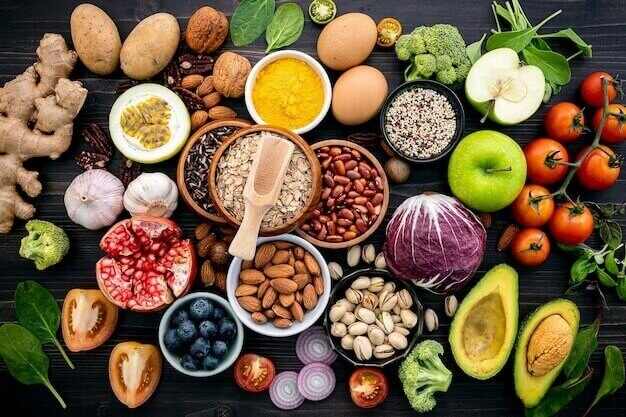Hey, do you want to know about the types of nutrition then you have come to the right place. In this article, we will cover all the information about the types of nutrition. Let’s begin!
Nutrition is critical to sustaining regular fitness and well-being. The technique offers critical nutrients to the frame for growth, repair, and maximum efficient functioning.
Knowing the diverse varieties of vitamins is critical for making knowledgeable picks approximately what we eat and the way it affects our bodies.
In this publication, we’ll examine numerous varieties of nutrients, from macronutrients to unique dietary necessities and general nutritional deficiencies.
Nutrition is the technique via which the body receives and uses nutrients from its food regimen.
For all organic systems to function properly, it is an essential part of human life. Food gives us strength, blocks for development and restoration, and compounds required for frame activities.
Types of Nutrition for the Human Body:
1. Macronutrients
Macronutrients are the key vitamins that the frame needs in considerable quantities. They produce strength and act as the muse for lots of body capabilities. Proteins, carbohydrates, and fats are the 3 necessary macronutrients.
Carbohydrates
Carbohydrates are the frame’s most vital power supply. It can be determined in cereals, end results, green vegetables, and legumes.
Based on their chemical composition, carbohydrates are labeled as either simple or complex. Simple carbs, which include sugar and honey, absorb speedily and offer immediate strength.
Because of their behind-schedule digestion, complicated carbs, inclusive of complete grains and starchy veggies, have prolonged strength.
Proteins
Protein is essential for tissue growth, healing, and regeneration. Amino acids are the main building blocks of proteins. Meat, fish, hen, dairy products, legumes, and nuts are all excessive in protein.
Proteins are also essential for enzyme production, hormone synthesis, and immunological characteristics.
Fats
Fat is an essential source of energy and is essential for the absorption of fat-soluble nutrients. They also supply organ insulation and protection.
While some fats, including saturated and trans fats, should be avoided, others, including monounsaturated and polyunsaturated fats, are considered wholesome and healthy.
Avocados, almonds, seeds, and olive oil are all pinnacle sources of healthy fat.
2. Micronutrients
Micronutrients are wished in lesser quantities, but they’re crucial for desirable fitness. Minerals and vitamins are among them.
Vitamins
Vitamins are chemical substances that are probably crucial for masses of human activities. They act as coenzymes, supporting enzymes in their duties.
Water-soluble nutrients (B nutrients and nutrients C) and fat-soluble vitamins are the two forms of nutrients (vitamins A, D, E, and K).
Types of nutrition serve a wonderful purpose and can be achieved through a well-balanced dietary regimen or supplementation.
Minerals
Minerals are inorganic compounds that may be required for some physical sporting activities. They are classified as macrominerals (needed in large amounts) and therefore as trace minerals (needed in smaller amounts).
Calcium, magnesium, iron, zinc, and iodine are examples of minerals. They are obtained by consuming plant and animal-based ingredients.
3. Water
Water is sometimes forgotten, it is a crucial element of types of nutrition. It is involved in many body activities, including temperature manipulation, digestion, absorption of vitamins, and waste removal.
It is generally recommended that you drink enough water every day to stay hydrated and feel good. We often forget the importance of water in terms of nutrition, but it is an essential part of a healthy lifestyle.
4. Balanced Diet
A properly-balanced food plan is essential for accomplishing dietary requirements and staying fit. It involves ingesting plenty of meals from various dietary classes in optimal amounts.
Components of a balanced weight loss plan
A well-balanced diet regime generally consists of:
- Fruits and vegetables are excessively rich in vitamins, minerals, and fiber.
- Whole Grains: Whole grains contain fixed carbohydrates, fiber, and other important elements.
- Lean proteins: hen, fish, beans, and lentils are examples of lean proteins.
- Dairy and dairy substitutes: for calcium and other vitamins.
- Good Fats: These can be found in avocados, almonds, and olive oil.
Benefits of a balanced food regimen
A properly-balanced diet has various blessings, including:
- Appropriate nutrient intake
- Keeping a wholesome weight
- Lowering the hazard of persistent ailments including coronary heart ailments and diabetes
- Promoting regular increases and improvements
- Improving common power degrees and intellectual well-being
5. Special Dietary Considerations
Some human beings may also require precise dietary guidelines due to their lifestyles, alternatives, or medical problems. Here are more than two examples:
Vegetarian and vegan diets
Animal products are not allowed in vegetarian or vegan diets. Vegetarians usually abstain from meat, poultry, and fish, but dairy and eggs can be eaten. Vegans, on the other hand, keep away from all objects produced by animals.
Those following those diets must ensure they get enough protein, iron, calcium, and vitamin B12 from plant-based total resources or through supplementation.
Gluten-unfastened food regimen
Those with celiac disease or gluten sensitivity must follow a gluten-free food regimen. It entails avoiding gluten-containing foods, which are probably found in wheat, barley, and rye.
Gluten-unfastened alternatives may be ingested rather, which encompass rice, maize, and quinoa.
Lactose-loose diet plan
Lactose-illiberal humans have trouble digesting lactose, the sugar contained in milk and dairy products.
A lactose-unfastened weight loss program includes maintaining or limiting the intake of lactose-containing meals and replacing them with lactose-unfastened alternatives or lactase nutritional supplements.
6. Sports Nutrition
Sports nutrients concentrate on improving overall performance and healing for athletes and truly every person who participates in physical exercise.
Adequate types of nutrition before, throughout, and after exercise is vital for maximum performance and maximum restoration.
Pre-exercise nutrients
A balanced lunch or snack before an exercise offers the strength required to keep the bodily activity going.
Carbohydrates for immediate strength and an inexpensive amount of protein for muscle repair and development have to be included.
Post-workout nutrients
The body requires vitamins after exercising to replace glycogen reserves and stimulate muscle regeneration. For exceptional recovery, a combination of carbs and protein is advised.
Hydration inside the route of exercise
Hydration is vital during exercise to maintain overall performance and avoid dehydration. To maintain a fluid balance, drink water, electrolyte-rich sports beverages, or fruit juice.
7. Nutrition for Different Life Stages
Dietary necessities vary according to existing stages. It is crucial to address precise dietary wishes at some point:
Infant vitamins
Breast milk and toddler additives deliver the vitamins that newborns require. It is crucial to introduce quite a few nutrient-rich meals after they transition to strong food for maximum pleasurable growth and improvement.
Childhood nutrients
Nutrition is critical for increases, cognitive improvement, and ultra-modern fitness in the course of early life. Healthy growth and development are supported by a balanced weight loss plan rich in fruits, greens, whole grains, and lean proteins.
Nutrition for the duration of pregnancy
Pregnancy goals include greater nutrients and useful resources for the growing fetus and the mother’s health. At this time, a well-balanced food regimen rich in folate, iron, calcium, and other essential elements is suggested.
Nutrition for older adults
Individuals’ dietary demands might also vary as they age thanks to dwindling metabolism and adjustments in body composition.
Sufficient protein and fiber-related nutrient-dense diets are crucial for fitness upkeep and the prevention of age-related ailments.
8. Common Nutritional Deficiencies
Some vitamin deficiencies can turn out to be the result of inadequate ingestion or absorption. Here are more than two examples:
Iron deficiency
Iron is needed for the formation of red blood cells and the mediation of oxygen. Anemia, resulting from iron deficiency, can cause tiredness, weakness, and decreased cognitive characteristics.
Iron-rich food consists of lean meats, beans, iron-fortified cereals, and leafy greens.
Vitamin D deficiency
Vitamin D is crucial for bone fitness, immunological function, and stylish well-being. Deficiency can cause bone weakness and increase the risk of infection.
It is possible to prevent vitamin D deficiency by getting enough sunlight, eating fortified dairy products, eating fatty seafood, and taking supplements.
Iodine deficiency
In order to regulate metabolism, thyroid hormones require iodine. Thyroid diseases and decreased cognitive improvement can result from iodine shortages. Iodine is found in iodized salt, shellfish, and dairy products.
Conclusion
Knowing the diverse styles of nutrition is important for maintaining a healthy lifestyle. Macronutrients, micronutrients, hydration, and a nicely-balanced weight-reduction plan all play important roles in preferred health and well-being.
Specific nutritional issues and special dietary needs at numerous stages of life need additional consideration. We may additionally enhance our health and excellent existence by emphasizing types of nutrition and making educated choices.
Frequently Asked Questions
A: Indeed, a well-balanced weight loss plan can also offer the bulk of the favored vitamins. Some humans, however, may also require nutritional dietary supplements because of scientific problems or dietary limitations.
A: While calorie monitoring might, in all likelihood, aid in weight loss, focusing on nutrient-dense ingredients and aspect control are essential for normal health.
A: All fat is no longer terrible for you. Avocados, almonds, and olive oil embody healthy fat, which is genuine in your coronary heart and has well-known fitness blessings.
A: Vegetarian and vegan diets can be healthy when properly planned to ensure adequate dietary intake. Those following them should ensure that they collect enough protein, iron, calcium, and vitamin B12.
A: If you’ve got a dietary deficit, you ought to see a medical doctor who can observe your signs and symptoms, carry out applicable checks, and suggest nutritional modifications or dietary supplements if necessary.




